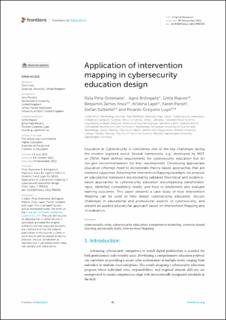| dc.contributor.author | Pirta-Dreimane, Rūta | |
| dc.contributor.author | Brilingaitė, Agnė | |
| dc.contributor.author | Majore, Ginta | |
| dc.contributor.author | Knox, Benjamin James | |
| dc.contributor.author | Lapin, Kristina | |
| dc.contributor.author | Parish, Karen | |
| dc.contributor.author | Sütterlin, Stefan | |
| dc.contributor.author | Lugo, Ricardo Gregorio | |
| dc.date.accessioned | 2023-02-08T10:21:26Z | |
| dc.date.available | 2023-02-08T10:21:26Z | |
| dc.date.created | 2022-12-13T10:55:46Z | |
| dc.date.issued | 2022 | |
| dc.identifier.citation | Frontiers in Education. 2022, 7, Artikkel 998335. | en_US |
| dc.identifier.issn | 2504-284X | |
| dc.identifier.uri | https://hdl.handle.net/11250/3049201 | |
| dc.description.abstract | Education in Cybersecurity is considered one of the key challenges facing the modern digitized world. Several frameworks, e.g., developed by NIST or ENISA, have defined requirements for cybersecurity education but do not give recommendations for their development. Developing appropriate education offerings need to incorporate theory-based approaches that are evidence supported. Adopting the Intervention Mapping paradigm, we propose an educational framework incorporating validated theoretical and evidence-based approaches to cybersecurity education encompassing stakeholders' input, identified competency needs, and how to implement and evaluate learning outcomes. This paper presents a case study of how Intervention Mapping can be used to help design cybersecurity education, discuss challenges in educational and professional aspects of cybersecurity, and present an applied educational approach based on Intervention Mapping and its evaluation. | en_US |
| dc.language.iso | eng | en_US |
| dc.publisher | Frontiers Media S.A. | en_US |
| dc.rights | Navngivelse 4.0 Internasjonal | * |
| dc.rights.uri | http://creativecommons.org/licenses/by/4.0/deed.no | * |
| dc.subject | cybersecurity roles | en_US |
| dc.subject | cybersecurity education | en_US |
| dc.subject | competence modeling | en_US |
| dc.subject | scenario-based learning | en_US |
| dc.subject | personality traits | en_US |
| dc.subject | Intervention Mapping | en_US |
| dc.title | Application of intervention mapping in cybersecurity education design | en_US |
| dc.type | Peer reviewed | en_US |
| dc.type | Journal article | en_US |
| dc.description.version | publishedVersion | en_US |
| dc.rights.holder | © 2022 Pirta-Dreimane, Brilingaite, ˙ Majore, Knox, Lapin, Parish, Sütterlin and Lugo. | en_US |
| dc.subject.nsi | VDP::Samfunnsvitenskap: 200::Pedagogiske fag: 280 | en_US |
| dc.subject.nsi | VDP::Teknologi: 500::Informasjons- og kommunikasjonsteknologi: 550 | en_US |
| dc.source.volume | 7 | en_US |
| dc.source.journal | Frontiers in Education | en_US |
| dc.identifier.doi | 10.3389/feduc.2022.998335 | |
| dc.identifier.cristin | 2092423 | |
| dc.relation.project | The EEA and Norway Grants Fund for Regional Cooperation: LT08-2-LMT-K-01-051 | en_US |
| dc.source.articlenumber | 998335 | en_US |
| cristin.ispublished | true | |
| cristin.fulltext | original | |
| cristin.qualitycode | 1 | |

